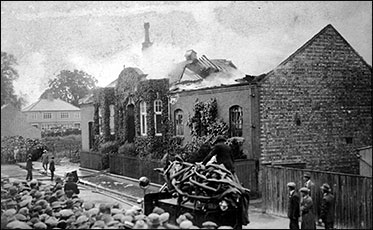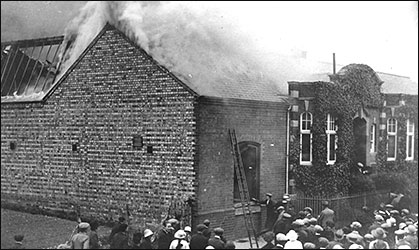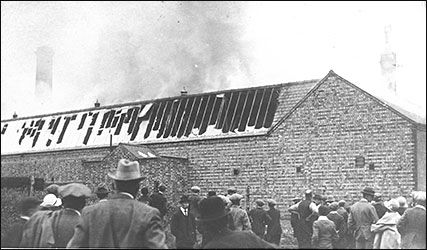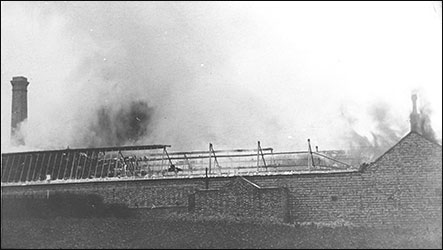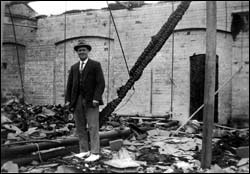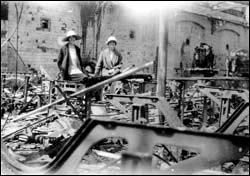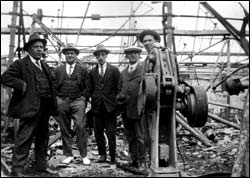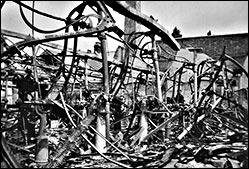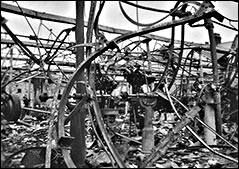A factory fire in Rushden, having very serious results, occurred on Saturday last. Messrs. Sanders and Sanders’s factory in Spencer-road being completely destroyed – so far as the main building was concerned. At a most unusual hour, so far as an outbreak could be feared – namely
6 p.m.
– smoke was seen rising from the factory by members of the firm who were at a garden party in the grounds of “Moorland House” (the residence of Mr. and Mrs. W. B. Sanders). Mr. Tom Sanders ran across to the works, gained access to the office, telephoned the Rushden Fire Brigade, and, with assistance, got the contents of the safe out of the factory. Samples and other less important materials had to be left, as the heat was terrific. The clicking department was a mass of flames at that time. The factory, being on the American principle, of one floor, with low wooden partitions only between the various departments, was beyond hope even had a fire brigade been on the scene when the smoke was noticed. The Rushden Fire Brigade, under Second Officer W. Packwood (Capt. R. F. Knight arriving shortly afterwards from out of town), were very quickly on the scene with the motor tender and equipment, and the steamer was then fetched. Water was being poured into the building four minutes after the call was received. The four members of the Brigade who first arrived were advised by Hon. Capt. Fred Knight, who chanced to be near, that to call other brigades was needless, as no amount of brigades would then have saved the factory, while Rushden alone could do the other necessary work of confining the flames to the four walls. This proved to be the case. The Rushden Brigade (soon at full strength) got two lengths of hose out, one on a hydrant in Spencer-road, and another on the 8in. main at the junction of Washbrook-road and High-street. In order to make easier the task of the Brigade at the junction hydrant, Second Officer Packwood and the police diverted vehicular traffic round the North-street and Shirley-road loop. Water from the various jets supplied was poured on to the vital places, with the result that the leather store, oil tank, and new engine at the back were saved, the fire being controlled soon after 6.30. Several members of the Brigade left at
midnight
after strenuous and effective work, but others remained on duty until
6 a.m.
Sunday, all doing remarkably good service.
Mr. W. B. Sanders, who for some time past has not enjoyed the best of health, was so much affected by shock that it was necessary to summon his medical attendant on Saturday evening.
The cause of the fire is a mystery. At
3.30 p.m.
the premises were completely in order, the caretaker then leaving. At
6 p.m.
the fire had destroyed the clicking department and the rest was doomed. A
London
newspaper reported that the estimated damage was £45,000, but the loss is probably not so excessive as that, though it may be above half that amount.
The large number of workpeople (between 150 and 200) were thrown temporarily out of employment. To meet the necessity of providing work and of getting the business started again, a conference of the Union operatives was held at the offices of the Boot and Shoe Trade Union on Monday morning, called by notices posted on Sunday, and the Rushden Boot Manufacturers’ Association also met to offer any sort of practicable accommodation. The outcome was that a good number of operatives were at once absorbed by various manufacturers under special terms of temporary service – that is, to be allowed to go back to Messrs. Sanders and Sanders when the firm reopens in about six or seven weeks. This is considered likely, as the four walls appeared to experts who made a preliminary examination to be quite sound. The factory was built in 1909 to find better accommodation for the firm’s output, their previous works being the factory at the junction of High street and Station road.
Necessarily abandoned owing to the fire, an outing of the staff and employees to Wembley Exhibition had been arranged for to-morrow (Saturday).
Mr. W. B. Sanders is a well known and respected member of the
Park-road
Baptist
Church
, and has long been a School Manager. At the
Baptist
Church
, at the Park-road Wesleyan, and other Churches sympathetic references were made about the occurrence and the distress caused.
|
Rushden Echo, 4th July 1924, transcribed by Kay Collins
Finding Employment—Of the many employees thrown out of work by the fire at Messrs. Sanders and Sanders’s factory, 50 have already been placed in positions of a temporary nature, and it is hoped that 20 or more will have situations found for them, it being an arrangement between the Boot Manufacturers’ Association (represented by Miss Peck, secretary) of the Rushden branch and the Boot Operatives’ Union.
|
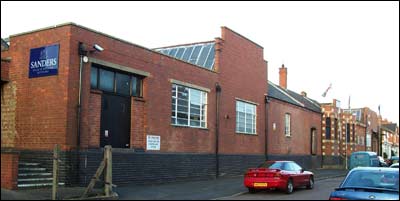 |
The factory today in Spencer Road.
Rebuilt following the fire, it is still thriving today.
Photo taken 2010
|
Index of Fires
|
